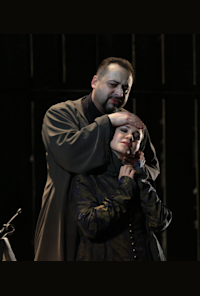Musical Theatre. Stanislavsky and Nemirovich-Danchenko returns the opera "Khovanshchina" by Modest Mussorgsky to the repertoire. The premiere screenings of the revived production will take place on the Main Stage on April 13 and 14, 2022
"Khovanshchina" in terms of the originality of music, in terms of its plot, perhaps, could become the most "Russian" opera. The composer defined its genre as follows - folk musical drama. "Khovanshchina" is a series of historical sketches, which depict the fate of real historical and fictional characters by the composer himself. On these sketches, a special place is occupied by the Russian people. It is difficult to find at least one positive hero in the opera, but it is easy to discern the “ill-fated Russia, the sufferer” ... Mussorgsky began composing his grandiose historical collage in 1872, precisely at a time when interest in Russian history was greater than ever. The plot of the opera intertwines historical events that took place between the Streltsy revolt of 1682 (it gave the name to the opera) and the final approval of Tsar Peter Alekseevich in power. The Russian people then found themselves torn apart by a dispute about the choice of their civilizational path, a dispute about the old and new faith, tormented by the age-old questions "who is to blame" and "what to do." Any outcome of the dispute, as well as any answer to the question, would be fatal for Russia. Indeed, in terms of depth, in spirit, Khovanshchina could become the most Russian opera, if the composer had brought his author's intention to the end.
Mussorgsky worked long and hard, started and abandoned his compositions: by the time of the composer's death in 1881, Khovanshchina, with the exception of the final scene of the last act, was ready in the clavier. The majestic scale of Mussorgsky's unfinished opera was the first composer to recognize Rimsky-Korsakov, who orchestrated the work and completed the final scene (for a long time, Khovanshchina existed precisely in Rimsky-Korsakov's version). In the XX century. another edition of Khovanshchina appeared: Shostakovich created his own version, the musical solution of which is characterized by a sense of gloom, and sometimes all-consuming existential horror.
The Musical Theater performs its Khovanshchina, which premiered in 2015, in Dmitri Shostakovich's version. The music for the final scene of the opera was written by Vladimir Kobekin, a living composer.
The musical director of the production and revival was Alexander Lazarev, who made the recognized standard recordings of many Russian operas. Stage director and director of the revival - Alexander Titel, set designer - Vladimir Arefiev, chief choirmaster - Stanislav Lykov.
Soloists of the opera troupe who have already participated in Khovanshchina on the stage of the theater will take part in the renewed performance: bass Dmitry Ulyanov will appear as Ivan Khovansky, tenor Nikolai Erokhin as his son Andrei Khovansky, mezzo-soprano Natalia Zimina and Ksenia as Martha Dudnikov. In addition, the parties are preparing for the premiere performances of the resumption of Khovanshchina: bass Igor Korostylev (Dosifey), tenor Vladimir Dmitruk (Prince Vasily Golitsyn), tenor Kirill Matveev (Andrey Khovansky), as well as soloists-probationers of the troupe.





